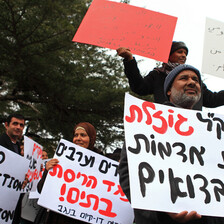The Independent 1 November 2002
A former Israeli army chief who presided over the controversial invasion of Jenin this year, and who is being investigated by Scotland Yard over allegations of war crimes, was named as Israel’s new Defence Minister yesterday, an aide to Ariel Sharon said.
Lieutenant-General Shaul Mofaz, who has flown back to Israel after Scotland Yard started investigating him during a fund-raising tour of Britain, had been Chief of Staff for most of the current Palestinian intifada until he retired in July.
After Mr Sharon offered him the post of Defence Minister in a meeting last night, General Mofaz said he would give his answer in a few days. An aide to Mr Sharon said the general had agreed in principle to take the job. The appointment must be approved by the Knesset.
Mr Sharon is trying to put together a new coalition government with the support of the far right after his left-wing Labour party partners left the government in a dispute over funding for settlements.
In General Mofaz’s time at its head, the Israeli army came under international criticism for tactics used against Palestinians, including the routine assassination of militants, in what the authorities euphemistically call “targeted killings”. The army was condemned in particular criticism for its invasion and reoccupation of cities in the West Bank in April, especially Jenin, where bulldozers levelled an entire neighbourhood of more than 100 houses.
There were numerous witness accounts of atrocities, both in Jenin and in another city, Nablus. Many Palestinians gave convincing accounts of being used as human shields by Israeli soldiers.
There are fears that a coalition with far-right parties, which are even less disposed to compromise with the Palestinians than Mr Sharon, could derail what little is left of the peace process. Without the restraining influence of Labour, there are fears of harsh new repression against Palestinians.
The Israeli newspaper Yediot Ahronoth reported yesterday that General Mofaz had been advised to return to Israel from Britain by the Israeli embassy after Scotland Yard opened an investigation into his role in alleged war crimes, but other reports in Israel said he had returned because of the defence ministry job offer.
The British investigation was opened after Imran Khan, a British lawyer known for his role in the Stephen Lawrence case, submitted a 17-page dossier to the Director of Public Prosecutions on behalf of the families of alleged victims, accusing General Mofaz of responsibility as commander for alleged war crimes by the Israeli army.
Mr Khan argues that Britain is empowered – and obliged – by the Geneva Conventions to investigate and prosecute any breach of the conventions, wherever they occur. Though Mr Khan says the investigation can continue even though General Mofaz has left Britain, whether the case will go any further is unclear.
There appear to be months of political uncertainty ahead in Israel, at a time when the country is facing the imminent threat of being dragged into a conflict between the United States and Iraq.
Mr Sharon has made clear he does not want to call early elections, but is trying to stay in power with the backing of the far right. That will only give him a small majority in parliament, and will provide Israel with a fractious government – some far-right leaders are not well disposed towards Mr Sharon.
Shimon Peres, one of the architects of the Oslo accords, who reluctantly resigned as Foreign Minister when his party leader, Binyamin Ben-Eliezer, pulled Labour out of the government, was reported to have turned down an offer from Mr Sharon to stay on at the Foreign Ministry. Keeping Mr Peres on board would have boosted Mr Sharon’s international standing.
Observers believe that even if Mr Sharon succeeds in forming a coalition with the far right, it will not last long. But it may last long enough to help him win his leadership election for the Likud party against Binyamin Netanyahu.


